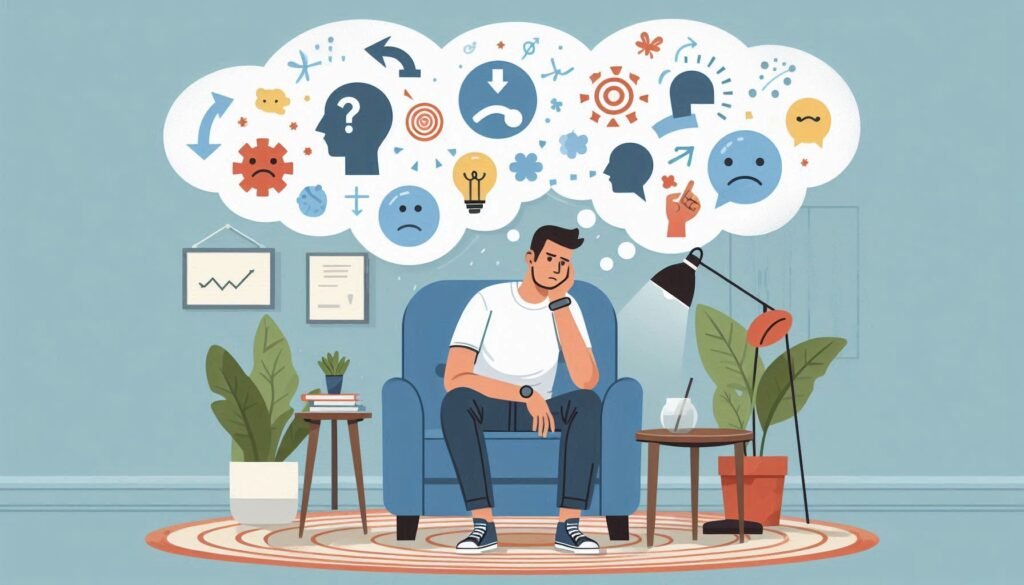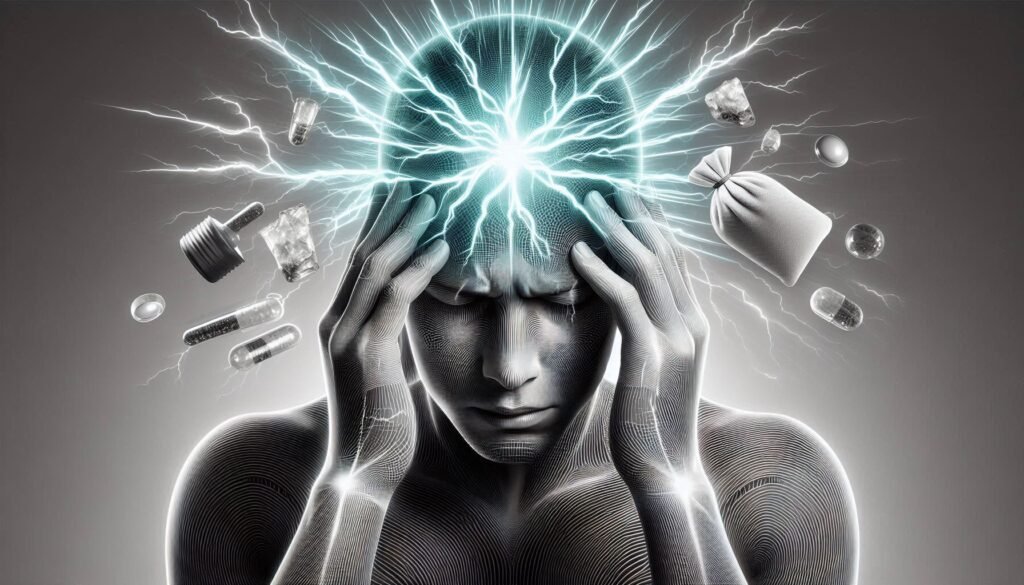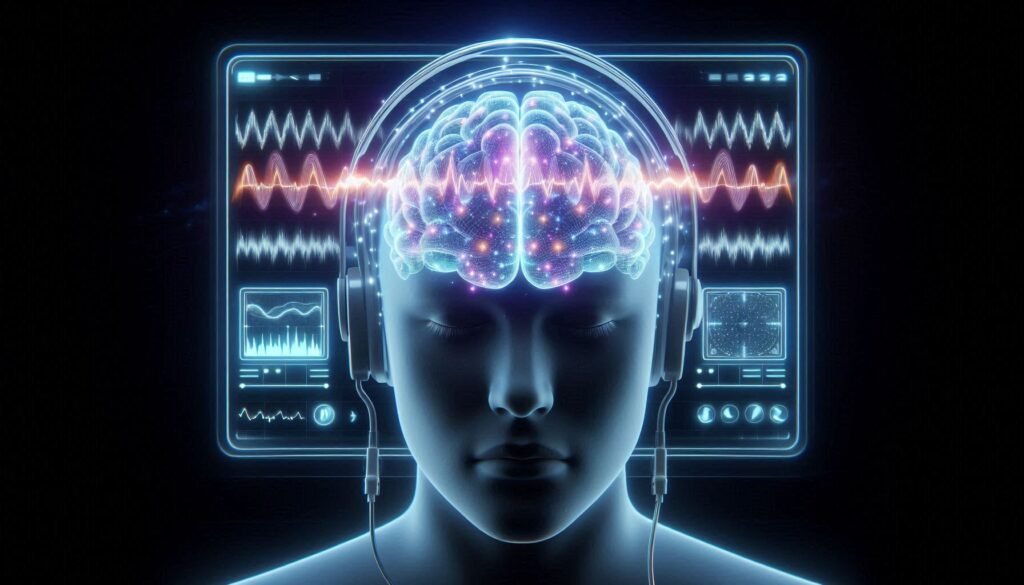Post-concussion syndrome (PCS) can leave individuals feeling lost and overwhelmed, grappling with physical symptoms and psychological challenges. The journey to recovery isn’t just about healing the brain; it’s also about addressing the mental health aspects that accompany this condition. Cognitive Behavioral Therapy (CBT) has emerged as a powerful tool in navigating these complexities.
This therapeutic approach focuses on how our thoughts, feelings, and behaviors intertwine. By understanding this relationship, individuals recovering from PCS can regain control over their lives. Whether it’s dealing with anxiety after an injury or managing persistent headaches, CBT offers practical strategies for improvement.
In this article, we’ll explore various facets of CBT tailored specifically for post-concussion syndrome: from identifying negative thought patterns to enhancing sleep hygiene techniques. Join us as we delve into ways cognitive behavioral therapy can pave the path toward a healthier mind and body following concussion-related challenges.

Understanding the Psychological Aspects of Post-Concussion Syndrome
Post-concussion syndrome involves more than just physical symptoms; psychological factors play a significant role in the recovery process. Patients often experience anxiety, depression, and mood swings alongside headaches and cognitive difficulties. These emotional responses can complicate healing.
The brain’s injury can disrupt normal emotional regulation, leading to increased stress levels. Consequently, individuals may find themselves feeling irritable or withdrawn from social interactions they once enjoyed. This shift in behavior can create a cycle of isolation that exacerbates mental health issues.
Cognitive distortions also frequently occur after a concussion. Individuals may develop negative thought patterns that influence their outlook on recovery and daily functioning. For example, feelings of hopelessness might make simple tasks feel insurmountable.
Understanding these psychological aspects is crucial for effective treatment planning. Addressing both the mental and physical facets of post-concussion syndrome fosters comprehensive care, allowing patients to reclaim their lives while navigating through the complexities of recovery.
The CBT Model: Addressing Thoughts, Emotions, and Behaviors
Cognitive Behavioral Therapy (CBT) is a structured approach that focuses on the interconnectedness of thoughts, emotions, and behaviors. This model emphasizes how negative thought patterns can influence emotional well-being and behavior, particularly in those suffering from post-concussion syndrome.
Through CBT, individuals learn to identify distorted thinking. For example, they may believe their symptoms will never improve or that they are a burden to others. Such beliefs can exacerbate anxiety and depression, hindering recovery.
The next step involves challenging these negative thoughts. Patients are guided to assess the validity of their beliefs and replace them with more balanced perspectives. This cognitive restructuring promotes healthier emotional responses.
CBT encourages behavioral changes that reinforce positive outcomes. By engaging in activities aligned with their values despite discomfort or fear, patients can gradually reclaim control over their lives while fostering resilience against ongoing challenges related to post-concussion syndrome.
Identifying and Challenging Negative Thought Patterns Post-Concussion
Negative thought patterns can significantly impact recovery from post-concussion syndrome. Many individuals experience automatic thoughts that perpetuate feelings of distress and hopelessness. These thoughts often stem from fear, anxiety, or uncertainty about their condition.
Identifying these negative thoughts is the first step toward challenging them. Keeping a journal can help track recurring themes in your thinking. When you jot down situations that trigger negative emotions, you may start to recognize patterns in how you interpret events.
Once identified, it becomes crucial to challenge these distorted beliefs. Ask yourself if there’s evidence supporting your negative thought or if it’s based on assumptions or misconceptions. Reframing these thoughts into more balanced perspectives can foster a healthier mindset.
Engaging with a therapist trained in cognitive behavioral therapy (CBT) offers additional support during this process. They can guide patients through techniques designed specifically for overcoming negativity and enhancing resilience during recovery from post-concussion syndrome.
Behavioral Activation: Encouraging Positive Activities Despite Symptoms
Behavioral activation is a key component of Cognitive Behavioral Therapy for Post-Concussion Syndrome. It focuses on helping individuals engage in meaningful activities, even when they experience persistent symptoms. By encouraging positive interactions with the world, patients can counteract feelings of isolation and hopelessness.
Many people facing post-concussion syndrome find that their energy levels and motivation decline due to cognitive and physical challenges. Behavioral activation helps break this cycle by promoting small, manageable tasks tailored to each person’s current abilities. This gradual approach fosters accomplishment and encourages participation in enjoyable experiences.
Incorporating structured routines can also be beneficial. Establishing daily schedules allows individuals to plan activities that spark interest or joy while ensuring they do not overexert themselves.
Support from therapists or loved ones enhances this process further. They can help identify interests and remind patients of the importance of engaging with life despite ongoing difficulties.
Stress Management Techniques in CBT for Concussion Recovery
Stress management is crucial for individuals recovering from post-concussion syndrome. Cognitive Behavioral Therapy (CBT) offers effective techniques that help manage stress and improve overall well-being. These strategies focus on understanding the link between thoughts, emotions, and physical symptoms.
One common technique involves mindfulness practices. Mindfulness encourages patients to stay present in the moment, reducing anxiety about their recovery process. This shift in focus can significantly alleviate feelings of overwhelm.
Another essential method is cognitive restructuring. Patients learn to identify negative thought patterns that contribute to stress. By challenging these thoughts and replacing them with more balanced perspectives, individuals can reduce their emotional distress.
Breathing exercises are also effective tools within CBT for managing stress. Simple deep-breathing techniques promote relaxation and lower heart rates during moments of heightened anxiety or discomfort associated with concussion recovery. Integrating these approaches into daily routines fosters resilience and empowers patients on their road to healing.
Sleep Hygiene Interventions Within the CBT Framework
Sleep hygiene is a crucial aspect of recovery for individuals suffering from post-concussion syndrome. Cognitive Behavioral Therapy (CBT) offers effective strategies to improve sleep quality, which can significantly impact overall well-being. Establishing consistent sleep routines is fundamental; going to bed and waking up at the same time every day helps regulate the body’s internal clock.
Creating a restful environment is another key element of good sleep hygiene. This involves reducing noise, keeping the bedroom dark, and maintaining a comfortable temperature. Limiting screen time before bedtime also plays an important role, as blue light emitted by devices can interfere with melatonin production.
CBT approaches encourage relaxation techniques such as deep breathing or progressive muscle relaxation right before bed. These practices help calm racing thoughts that often accompany concussive symptoms, making it easier to drift off into restorative sleep.
Additionally, CBT emphasizes recognizing and altering negative beliefs about sleep itself. By reframing these thoughts—like “I’ll never get enough rest”—patients can alleviate anxiety surrounding their sleep challenges and enhance their recovery journey.
Pain Management Strategies Using Cognitive Behavioral Approaches
Pain management is a crucial aspect of recovery from post-concussion syndrome. Cognitive Behavioral Therapy (CBT) offers effective strategies to help individuals cope with pain more constructively. By reframing how patients perceive their discomfort, CBT empowers them to take an active role in managing their symptoms.
One approach within CBT involves identifying negative thought patterns that exacerbate the perception of pain. Patients learn to challenge these thoughts and replace them with more balanced, realistic beliefs. This mental shift can significantly reduce feelings of helplessness associated with chronic pain.
In addition, behavioral techniques such as relaxation training can be beneficial. These methods teach individuals to develop skills for calming both the mind and body during painful episodes, promoting a sense of control over their experience.
Gradually increasing activity levels through a structured plan also plays a vital role in pain management using CBT. Engaging in positive activities helps distract from discomfort while reinforcing resilience against pain-related challenges.
Addressing Anxiety and Depression in Post-Concussion Syndrome
Post-concussion syndrome (PCS) can lead to heightened levels of anxiety and depression. These emotional challenges often stem from the unpredictable nature of symptoms and the impact on daily life. Individuals may feel overwhelmed by their inability to return to normal activities, which can exacerbate feelings of hopelessness.
Cognitive Behavioral Therapy (CBT) is a powerful tool for addressing these emotions in PCS patients. By helping individuals identify negative thought patterns, CBT provides strategies to reframe those thoughts into more positive perspectives. This shift not only alleviates immediate distress but fosters resilience over time.
Moreover, CBT encourages coping mechanisms that reduce anxiety and enhance mood stability. Techniques such as mindfulness practices and relaxation exercises promote calmness during difficult moments. Patients learn that they have control over their responses rather than being victims of their circumstances.
Therapists work collaboratively with patients to develop personalized treatment plans targeting specific anxieties or depressive symptoms related to concussion recovery. This tailored approach makes all the difference in navigating mental health challenges effectively.
Goal Setting and Problem-Solving in CBT for Concussion Patients
Goal setting is a crucial aspect of Cognitive Behavioral Therapy for patients recovering from post-concussion syndrome. By establishing clear and achievable goals, individuals can create a roadmap for their recovery journey. This process helps to enhance motivation and provides direction amid the confusion often felt after sustaining a concussion.
In CBT, goal setting involves breaking down larger objectives into smaller, manageable steps. This incremental approach reduces feelings of overwhelm while cultivating a sense of accomplishment as each small goal is achieved. Whether it’s returning to work part-time or engaging in social activities, clearly defined targets make progress measurable.
Problem-solving techniques play an integral role alongside goal setting. Patients learn to identify obstacles that hinder their recovery and develop strategies to overcome these challenges. By fostering resilience through problem-solving skills, individuals become more adept at navigating setbacks that may arise during rehabilitation.
Encouraging patients to reflect on past successes reinforces their capability in handling current difficulties. This positive reinforcement builds confidence as they work through the complexities of post-concussion syndrome.
Integrating CBT with Other Treatment Modalities for Comprehensive Care
Integrating Cognitive Behavioral Therapy (CBT) with other treatment modalities can enhance recovery for individuals dealing with Post-Concussion Syndrome. While CBT effectively addresses the psychological aspects of this condition, combining it with physical rehabilitation, medication management, and lifestyle adjustments offers a more holistic approach.
Collaboration among healthcare providers is essential. Neurologists, psychologists, and physiotherapists can work together to create tailored treatment plans that address both physical and emotional symptoms. For instance, while CBT helps manage anxiety triggered by concussion-related challenges, physical therapy aids in restoring balance and coordination.
Medication may also play a role in alleviating severe symptoms such as chronic pain or depression. When combined thoughtfully with CBT techniques—like identifying negative thought patterns related to these issues—patients often experience improved outcomes.
Additionally, lifestyle modifications like nutrition counseling or exercise programs can support mental health alongside cognitive strategies from CBT. Such comprehensive care fosters resilience and empowers patients on their journey to recovery from Post-Concussion Syndrome.
By focusing on an integrative approach that involves various forms of therapy and support systems, individuals stand a better chance of regaining control over their lives—and ultimately finding relief from the lingering effects of concussions.


